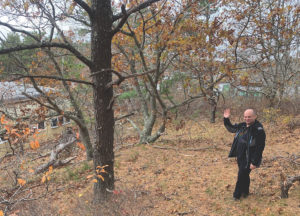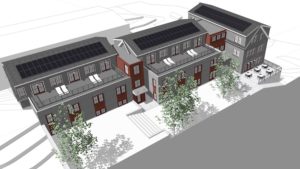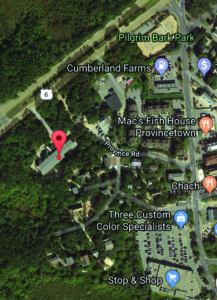PROVINCETOWN — Two of the most acute needs this community is facing, according to multiple studies, surveys, and the town’s own economic development plan, are year-round rental housing and seasonal employee housing.
Patrick Patrick, owner of Marine Specialties at 235 Commercial St., has proposed a building project that would help address both of them.
He wants to construct a building containing 15 units of year-round rental housing and a dormitory for 112 seasonal workers on land his family owns at 207 Route 6, just west of the highway’s intersection with Shank Painter Road. When he brought his proposal to the Provincetown Select Board on Nov. 12, the board praised and applauded him.

After discussing rental restrictions and the 9,150 sewer “gallons” required, the board voted 5-0 to approve the project, which will still have to go before the planning board and the zoning board of appeals before construction can begin.
In exchange for the grant of sewer gallons, Patrick proposed a covenant that would bar any other use of the building besides year-round and seasonal rentals. Board members were particularly enthusiastic about this commitment, as well as the fact that the project is on private land and requires no public money.
Patrick can trace his Provincetown lineage back eight generations. “Every business owner knows about the housing issue,” he told the Independent, “but it just keeps getting worse. Last year, some of my longtime employees had to move into the house my parents and I live in, because we couldn’t find anything else.”
The Route 6 project would have 28 dormitory-style rooms, each with two sets of built-in bunk beds, a full-size refrigerator, and a private bathroom. With four people per room, the dormitory would accommodate 112 people on seasonal leases. The building would also contain a large common kitchen, a common living area, a security desk, a laundry, and 15 apartments — nine one-bedrooms, five studios, and one three-bedroom.

The covenant Patrick submitted explicitly forbids short-term rentals, defined as 31 days or fewer, and can be amended only by a vote of the select board. After some discussion, the board included an amendment that would allow nonprofit organizations such as the Cape School of Art to rent out the dormitory space in the off season to host, for example, a series of one-week art programs in the fall or spring.
Select board members said that they were willing to give Patrick the large allotment of sewer gallons because of the restrictions in the covenant. The town’s sewer system is nearly at capacity, and while its expansion is being planned, there won’t be any additional gallons available “for about three years — and that’s an optimistic timeline,” acting Town Manager David Gardner told the select board.
There are only 23,500 unallocated gallons left in the current system, and only 11,400 of those gallons are for housing. “I want to be perfectly clear to the board that this project will take 80 percent of the remaining housing gallons,” Gardner said.

Board member Lise King sought assurances from Gardner that a decision to award these gallons would not derail the affordable housing plans at the VFW site on Jerome Smith Road. Because a project at the VFW would be backed by state grants and tax credits, “that is a several year process,” Gardner replied. “The timeline for the affordable housing project and the sewer expansion project are both about three years in the most optimistic case. We suspect that the wastewater treatment expansion will be ready by the time a housing project at the VFW would need the gallons.”
Patrick told the Independent that he is hoping to have his building ready for tenants in 18 months or less. His units would not be subsidized, and rents would be considered market-rate rather than affordable. But he added that the small size of the units, the out-of-the-way location, the dormitory design, and the prohibition on short-term rentals would keep rents low enough to be affordable to working people.
“I really want to commend you,” board member Bobby Anthony said near the end of the meeting. “This is a desperate need in Provincetown.”
“The town isn’t financing any of this,” John Golden said. “You are putting your own money up front. To me this is the best thing to come across us in a long time.”



